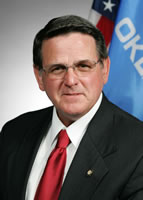Barrington Wants People's Vote on Disaster Relief Funding
 Sen. Don Barrington
Sen. Don Barrington
Oklahomans could vote this fall to change how the state handles funds from the Constitutional Reserve Fund, commonly known as the Rainy Day Fund, following natural disaster declarations. Sen. Don Barrington said his amendment to HB 1519, both of which the Senate approved Tuesday, would get communities and counties their money faster following natural disasters.
"Luckily on May 3, 1999, when the largest tornado in history swept through central Oklahoma, the Legislature was in session so they could vote to appropriate money to help those communities like Moore that were affected. But when disasters strike at other times of the year, communities and counties are forced to wait on their funding," said Barrington, principal Senate author of HB 1519. "We have not been fulfilling our obligation to counties and communities struck by disasters and it's important that we get them their funding as soon as possible so they can be whole again."
Rep. Joe Dorman is the principal author of HB 1519 and worked with Barrington on the language for the amendment.
“Politics should not come into play when we have a disaster on hand that needs immediate attention,” said Dorman, D-Rush Springs. “The Rainy Day Fund is our account for emergencies and this will take care of the funding problem for the disaster and also not require the legislators to return to a costly special session if after May or before February.”
Barrington noted that Comanche County just recently received $5.25 million in disaster relief funding from the state for an ice storm that occurred in December 2000.
"This is only one example of many. Think about how much building supplies and other products have increased in price since 2000. In essence, Comanche County lost money because the state didn't do its job in a timely manner. They can't do the same things with that money that they could have had they received it right after the disaster," said Barrington, R-Lawton. "This constitutional change would ensure that counties and communities get the funding they need in a more timely manner."
When federal disaster relief funding is offered to the state, in order to receive the full funding the state must match 12.5 percent. Counties and communities are responsible for another 12.5 percent while FEMA takes care of the remaining 75 percent in costs.
Barrington's amendment would require that the state’s part be paid from the Rainy Day Fund within 30 days of the Oklahoma Department of Emergency Management determining the appropriate amount for that fiscal year. That amount would have to be paid prior to any other withdrawals from the Fund. The Contingency Review Board would be able to approve or disapprove the payment based on availability of funds without an appropriation from the Legislature. The Legislature would still be able to pass laws to regulate the use of the funds, as long as those laws did not lessen federal disaster relief money for the state.
“This has been a team effort on finding a way to immediately fund the match that FEMA requires from the state,” said Dorman. “Senators Barrington, Corn and I examined ways to provide this funding to the entities that qualify and this seemed like the obvious choice. The amount cannot be questioned due to the federal allocation, so we are required to spend this definite amount for the 12.5 percent match.”
The measure is now awaiting consideration in the House.
 Oklahoma Senate
Oklahoma Senate

